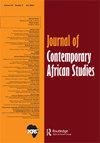从社会学角度看洋泾浜语对西非发展的可行性和有用性
IF 0.8
Q2 AREA STUDIES
引用次数: 1
摘要
本文考察了洋泾浜语在西非发展中的可行性和实用性。在西非,洋泾浜语作为一种统一的交流媒介在没有共同语言的人们之间经久不衰。它被誉为一种中立的语言,促进了各行各业的人们之间的贸易、商业和日常交往。一些人提议用洋泾浜语或其他土著语言取代英语,因为英语是大多数西非国家的官方语言,在那里洋泾浜语的使用很普遍。然而,持反对意见的人认为洋泾浜语是一个限制因素,因为它是说、读、写标准英语的障碍,因此阻碍了向上流动。他们认为,引进洋泾浜语或其他一些土著语言可能会造成一些政治反弹,以及人民之间的冲突。使用定性分析,我们从社会学的角度审视这一争论。本文章由计算机程序翻译,如有差异,请以英文原文为准。
A Sociological Perspective on Pidgin's Viability and Usefulness for Development in West Africa
This essay examines the viability and usefulness of pidgin for development in West Africa. Pidgin in West Africa has endured as a unifying medium of communication among people who do not share a common language. It has been lauded as a neutral language that facilitates trade, commerce, and everyday dealings among people of all walks of life. Some have proposed supplanting English, which is the official language in most of the West African countries where the use of pidgin is prevalent, with either pidgin or some other indigenous language. Contrarians, however, consider pidgin to be a limiting factor, in that, it is a barrier to speaking, reading, and writing standard English, and thus impedes upward mobility. They argue that projecting pidgin or some other indigenous language may create some political backlash, and strife among the people. Using qualitative analysis, we examine this debate from a sociological perspective.
求助全文
通过发布文献求助,成功后即可免费获取论文全文。
去求助
来源期刊

Journal of Contemporary African Studies
AREA STUDIES-
CiteScore
2.20
自引率
0.00%
发文量
18
期刊介绍:
Journal of Contemporary African Studies (JCAS) is an interdisciplinary journal seeking to promote an African-centred scholarly understanding of societies on the continent and their location within the global political economy. Its scope extends across a wide range of social science and humanities disciplines with topics covered including, but not limited to, culture, development, education, environmental questions, gender, government, labour, land, leadership, political economy politics, social movements, sociology of knowledge and welfare. JCAS welcomes contributions reviewing general trends in the academic literature with a specific focus on debates and developments in Africa as part of a broader aim of contributing towards the development of viable communities of African scholarship. The journal publishes original research articles, book reviews, notes from the field, debates, research reports and occasional review essays. It also publishes special issues and welcomes proposals for new topics. JCAS is published four times a year, in January, April, July and October.
 求助内容:
求助内容: 应助结果提醒方式:
应助结果提醒方式:


